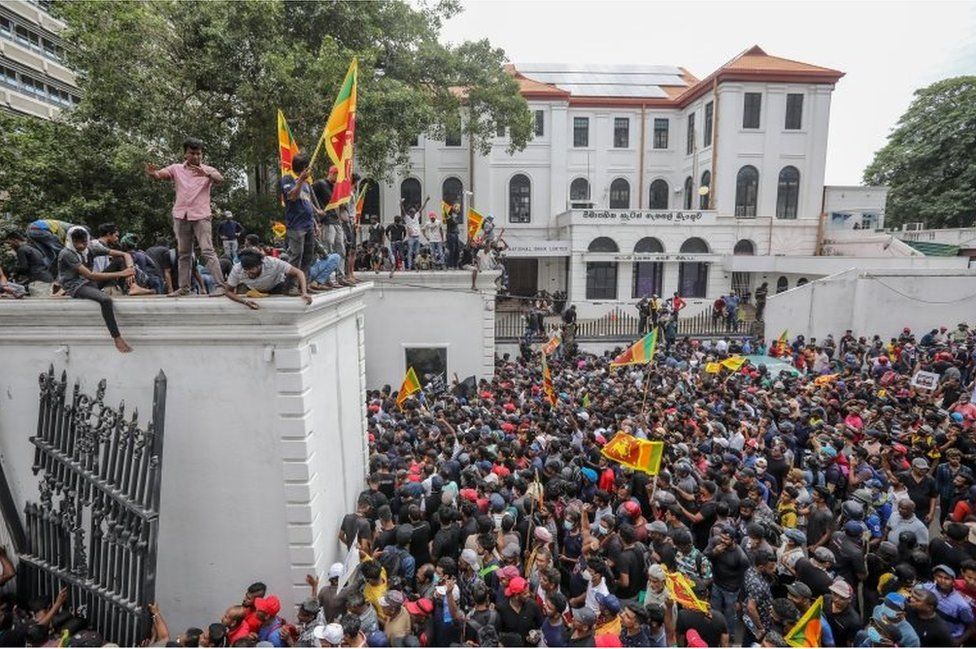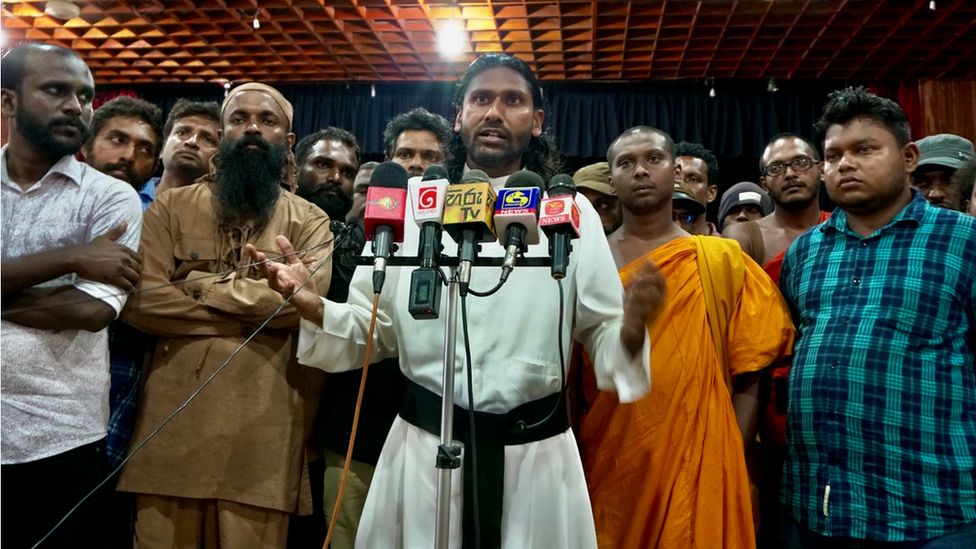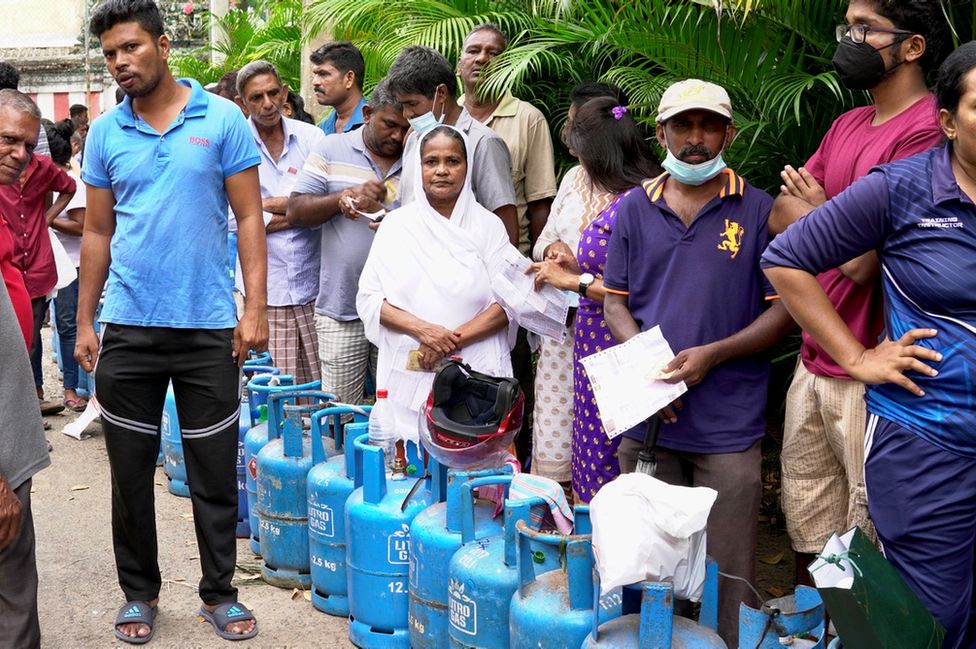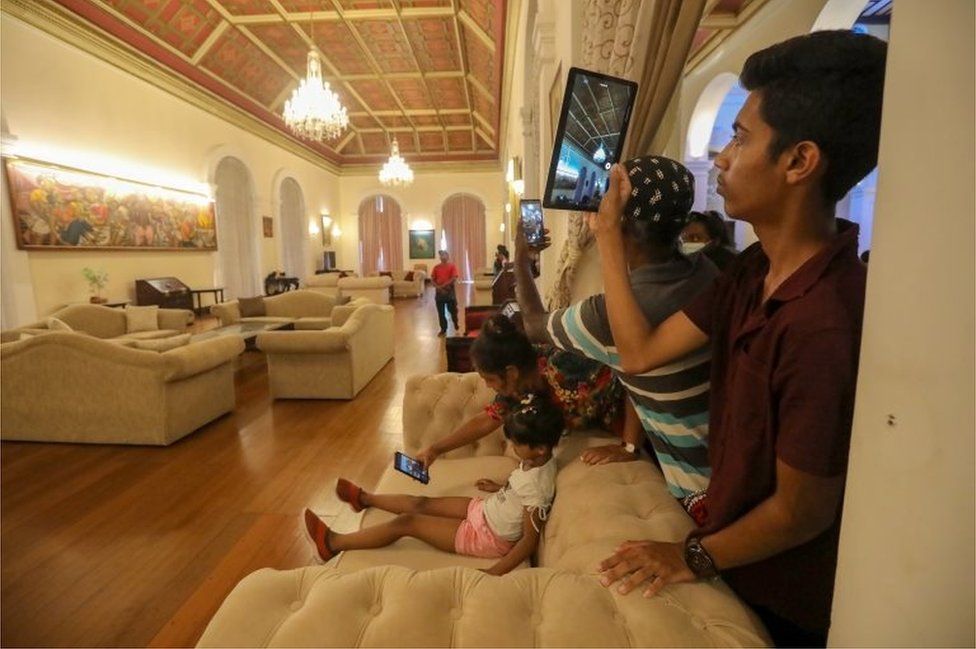 EPA
EPASri Lanka will see a "terrible, massive strike" and huge demonstrations if the president and prime minister do not quit by Wednesday, protest organisers and union leaders have warned.
This is the day President Gotabaya Rajapaksa has promised to resign after he fled crowds who stormed his palace, but many worry he won't keep his word.
A furious public blames him for their worst economic crisis in decades.
Sri Lankans are struggling with rolling power cuts and fuel and food shortages.
Prime Minister Ranil Wickremesinghe has said he would step down once an all-party interim government is set up following Mr Rajapaksa's departure.
But many Sri Lankans want him to leave immediately too - because once Mr Rajapaksa departs, under Sri Lanka's constitution, Mr Wickremesinghe would automatically become acting president for 30 days.
"If they do not go by the 13th [of July], we will restart the protests on a different level," protest organiser Father Jeevantha Peiris told the BBC.
"The trade unions and civil rights groups confirm from the 14th onwards they will start a terrible, massive strike along with all the protests." A union leader later confirmed this.

Student leader Wasantha Mudalige warned if the two leaders "try to fool the people, we will take drastic actions and it will be much more intense" than the mass protests on Saturday in the capital, Colombo.
Thousands had swarmed the presidential palace forcing Mr Rajapaksa, an authoritarian leader whose family has dominated the island's politics for almost two decades, to flee. His whereabouts are currently unclear.

Sri Lanka: The basics
- Sri Lanka is an island nation off southern India: It won independence from British rule in 1948. Three ethnic groups - Sinhalese, Tamil and Muslim - make up 99% of the country's 22 million population.
- One family of brothers has dominated for years: Mahinda Rajapaksa became a hero among the majority Sinhalese in 2009 when his government defeated Tamil separatist rebels after years of bitter and bloody civil war. His brother Gotabaya, who was defence secretary at the time, is the current president but says he is standing down.
- Presidential powers: The president is the head of state, government and the military in Sri Lanka but does share a lot of executive responsibilities with the prime minister, who heads up the ruling party in parliament.
- Now an economic crisis has led to fury on the streets: Soaring inflation has meant some foods, medication and fuel are in short supply, there are rolling blackouts and ordinary people have taken to the streets in anger with many blaming the Rajapaksa family and their government for the situation.

Amid uncertainty on the eve of his expected departure, organisers of the Aragalaya protest movement - named after the Sinhalese word for "struggle" - announced a list of demands at a public meeting with political parties and trade unions at Colombo library.
Besides demands for the resignations of the two leaders and everyone in their government, they also called for the executive presidency to be abolished, immediate economic relief and a People's Council to advise the government.
They also want the country's coffers, which most believe were drained by corruption, to be replenished. How this would be achieved is not clear.
Representatives of political parties in parliament were present and said they agreed with the protesters' points, with one lawmaker even saying sorry for allowing the country to slide into economic crisis under their watch.
"To my other parliamentarians: we should apologise and rectify the situation, and be accountable to the people," he said as the dozens-strong crowd clapped.

But some also warned the protests could not continue indefinitely as the country needed stability.
"Aragalaya has to accept whoever comes into power next. You cannot keep protesting," said one representative from the opposition Sri Lanka Freedom Party.
The question of what's next for the movement looms large.
This video can not be played
To play this video you need to enable JavaScript in your browser.
Since it began in May, it has been driven by ordinary citizens joining forces with a vast array of interest groups - from unionists and farmers to artists, students and socialists - for one single goal: removing Gotabaya Rajapaksa, his brother Mahinda and the rest of their family from power. The president is the only one of these who remains in office.
But the protest movement's hydra-headed strength has also proved to be a weakness: it has been largely leaderless with no charismatic figure emerging for people to unite behind.

Factions have clashed over the direction of the movement and one dispute between two socialist groups led to a physical fight that left several injured in the capital on Monday night, according to local media reports.
It has also meant the protest movement for now cannot offer a contender for the country's leadership once Mr Rajapaksa goes. Deep public suspicion of politicians has meant there is no clear favourite among those in parliament either.
Though the leader of the opposition Sajith Premadasa has put himself forward for the top job, he is seen by some as politically inexperienced and ineffective, and has yet to attract strong public support.
But protest organisers the BBC spoke to on Tuesday said they saw the movement remaining as a check on any future government, and were optimistic it could play a role in moving the country out of its current political and economic deadlock.
"With people power, it's possible," said Father Jeevantha. "The international community and the Sri Lanka diaspora, they are ready to help. People are united and ready to make sacrifices.
"We have a good moment now with the people's power."
https://news.google.com/__i/rss/rd/articles/CBMiLmh0dHBzOi8vd3d3LmJiYy5jby51ay9uZXdzL3dvcmxkLWFzaWEtNjIxNDAzNzjSATJodHRwczovL3d3dy5iYmMuY28udWsvbmV3cy93b3JsZC1hc2lhLTYyMTQwMzc4LmFtcA?oc=5
2022-07-12 15:39:21Z
1485373155
Tidak ada komentar:
Posting Komentar